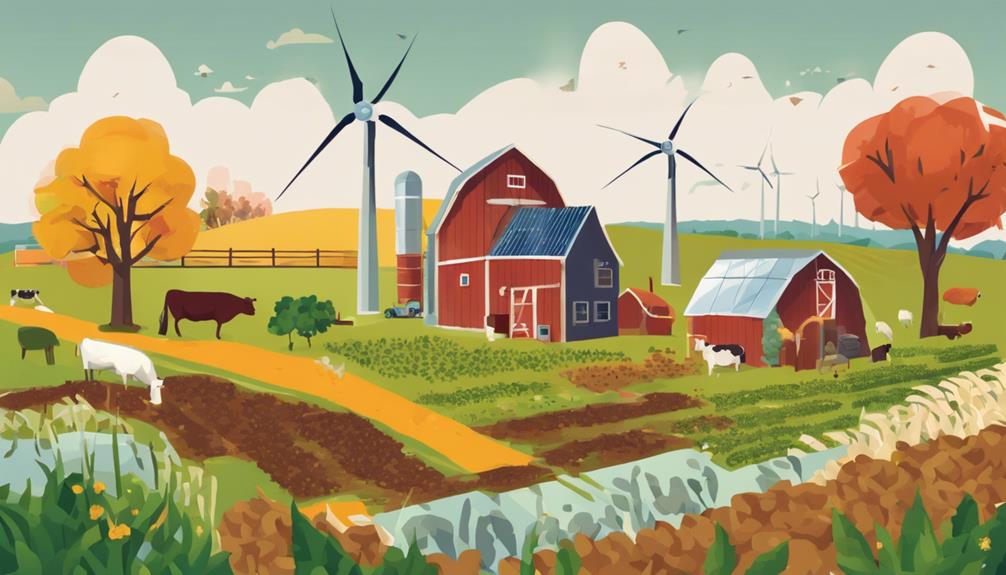Climate Change: The Transformative Role of Natural Farming
By embracing natural farming, you actively combat climate change. Techniques like crop rotation and cover cropping enhance soil organic carbon levels, sequestering atmospheric CO2. Organic farming reduces emissions by up to 40%, proven in studies as effective. Regenerative practices improve soil health, biodiversity, and resilience. Water conservation methods promote drought resistance and efficient resource use. Precision irrigation technologies optimize water usage, supporting sustainability. Embracing climate-smart agricultural practices is key. Harness the transformative power of natural farming to shape a sustainable future and mitigate climate impact significantly.
Organic Farming and Carbon Sequestration
Organic farming plays a significant role in carbon sequestration by promoting the storage of carbon in soil through natural processes. This methodology offers various benefits concerning carbon sequestration. The use of organic farming techniques such as crop rotation, cover cropping, and the application of compost can enhance soil organic carbon levels. These practices aid in sequestering atmospheric carbon dioxide by incorporating it into the soil, where it can remain stored for extended periods.
Carbon sequestration benefits associated with organic farming are substantial. Research indicates that organic farming methods can lead to higher soil organic carbon concentrations than conventional farming practices. By sequestering carbon in the soil, organic farming helps mitigate climate change by reducing the amount of carbon dioxide in the atmosphere. This not only has positive implications for soil health and fertility but also contributes to global efforts in combating rising greenhouse gas levels.
Furthermore, organic farming techniques such as reduced tillage or no-till farming can prevent the release of stored carbon back into the atmosphere. These practices help maintain soil structure and microbial activity, which are crucial for long-term carbon sequestration. Overall, the emphasis on organic farming in agriculture presents a promising avenue for enhancing carbon sequestration efforts and fostering sustainable land management practices.
Reduced Greenhouse Gas Emissions
A reduction in greenhouse gas emissions is a critical factor in addressing climate change and promoting environmental sustainability. Sustainable practices in natural farming play a vital role in emission reduction. By adopting methods such as cover cropping, crop rotation, and agroforestry, farmers can minimize the release of greenhouse gases like carbon dioxide, methane, and nitrous oxide into the atmosphere.
Cover cropping involves planting specific crops during off-seasons to enhance soil health, which in turn reduces the need for synthetic fertilizers that contribute to greenhouse gas emissions. Crop rotation helps break pest cycles naturally, decreasing the reliance on chemical pesticides that emit harmful gases. Agroforestry integrates trees into farming systems, sequestering carbon from the atmosphere and mitigating emissions.
Studies have shown that natural farming practices can lead to a significant decrease in greenhouse gas emissions compared to conventional agriculture. For instance, a meta-analysis published in the journal Agriculture, Ecosystems & Environment found that organic farming systems have the potential to reduce emissions by up to 40% compared to conventional farming methods.
Soil Health and Climate Resilience
Natural farming practices that enhance soil health play a pivotal role in building climate resilience. Regenerative agriculture techniques, such as carbon farming, focus on improving soil health through practices like minimal tillage, cover cropping, and crop rotation. These methods increase the soil's organic matter content, which helps sequester carbon from the atmosphere and improve soil structure.
Studies have shown that regenerative agricultural practices can lead to significant carbon sequestration in the soil. For example, a meta-analysis published in the journal 'Nature Sustainability' found that regenerative agriculture practices could sequester up to 3.5 tons of carbon per hectare per year. This carbon sequestration not only helps mitigate climate change by reducing the amount of carbon dioxide in the atmosphere but also improves soil fertility and water retention.
In addition to sequestering carbon, healthy soils are better able to withstand extreme weather events associated with climate change. Soils rich in organic matter are more resilient to droughts, floods, and temperature fluctuations. By improving soil health through regenerative agricultural practices, farmers can adapt to changing climatic conditions and maintain the productivity of their land.
Biodiversity Preservation in Agriculture
Preservation of biodiversity in agriculture is essential for maintaining ecosystem resilience and ensuring sustainable food production. Ecosystem balance is intricately tied to the diversity of plant and animal species within agricultural systems. Regenerative agriculture practices promote biodiversity by fostering a more natural and holistic approach to farming. By incorporating sustainable practices like crop rotation, agroforestry, and cover cropping, farmers can create environments that support a wide range of species, from pollinators to soil microbes.
Studies have shown that increasing biodiversity in agriculture can lead to improved soil health, pest control, and overall ecosystem stability. Diverse plantings help to enhance soil structure, increase water retention, and reduce the need for synthetic inputs like pesticides and fertilizers. This not only benefits the environment but also contributes to the long-term viability of farming operations.
Agroecology, which emphasizes the interconnectedness of ecological, social, and economic factors in agriculture, plays a crucial role in promoting biodiversity preservation. By adopting agroecological principles, such as integrating livestock into cropping systems or creating habitat corridors for wildlife, farmers can enhance biodiversity while simultaneously improving the resilience of their farms to climate change impacts.
Water Conservation and Climate Impact
Increasing water conservation practices in agriculture is paramount for mitigating the impact of climate change on farming systems. Drought resistance and enhancing agricultural productivity are key components in addressing water scarcity challenges. Sustainable farming practices, such as efficient irrigation management, play a crucial role in conserving water resources and adapting to changing climate conditions.
Effective drought resistance strategies involve utilizing crop varieties that are more tolerant to water stress, implementing soil conservation techniques to retain moisture, and adopting water-saving irrigation methods like drip irrigation. These approaches not only help in coping with water scarcity but also contribute to maintaining agricultural productivity in the face of climate variability.
Irrigation management is a critical aspect of sustainable farming that directly influences water conservation efforts. By utilizing modern irrigation technologies, farmers can optimize water usage, reduce wastage, and improve overall efficiency in water delivery to crops. Implementing precision irrigation techniques and monitoring soil moisture levels allow for targeted water application, ensuring that plants receive adequate water without excess runoff or evaporation.
Energy Efficiency in Organic Farming
Optimizing energy utilization is a crucial aspect of enhancing sustainability in organic farming practices. When considering energy efficiency in organic farming, it's essential to focus on sustainable practices and resource optimization.
Here are some key points to consider:
- Renewable Energy Sources: Incorporating renewable energy sources like solar panels or wind turbines can significantly reduce the reliance on non-renewable energy in organic farming operations. This transition not only promotes sustainability but also decreases the carbon footprint of the farm.
- Energy-Efficient Equipment: Investing in energy-efficient machinery and tools can lead to substantial energy savings over time. From irrigation systems to tractors, choosing equipment with high energy efficiency ratings can contribute to resource optimization and cost reduction.
- Crop Rotation and Cover Crops: Implementing crop rotation and cover cropping practices can enhance soil health, reducing the need for excessive energy-intensive inputs like synthetic fertilizers and pesticides. This approach not only conserves energy but also promotes a more sustainable and natural farming ecosystem.
Climate-Smart Agricultural Practices

Implementing climate-smart agricultural practices is essential for mitigating the impacts of climate change on farming ecosystems. Sustainable agriculture practices play a crucial role in enhancing climate resilience and ensuring the long-term viability of agricultural systems. These practices focus on increasing productivity while minimizing environmental impact, thus promoting carbon neutral farming and environmental stewardship.
One key aspect of climate-smart agricultural practices is the adoption of agroforestry techniques, which involve integrating trees and shrubs into agricultural landscapes. Agroforestry systems not only sequester carbon dioxide from the atmosphere but also provide additional benefits such as improved soil health, biodiversity conservation, and enhanced water retention.
Furthermore, promoting crop diversification and rotation is another effective strategy for building climate resilience in agricultural systems. Diversifying crops can help mitigate the risks associated with climate variability, pests, and diseases, while also improving soil fertility and reducing the need for chemical inputs.
In addition, the efficient use of water resources through practices like rainwater harvesting and drip irrigation can enhance the adaptive capacity of farming systems to changing climatic conditions. By implementing these sustainable and climate-smart agricultural practices, farmers can't only mitigate the impacts of climate change but also contribute to building a more resilient and environmentally sustainable food production system.
Organic Farming for Climate Mitigation
Organic farming practices offer a sustainable approach to mitigating climate change impacts on agricultural systems. By focusing on regenerative techniques, organic farming contributes significantly to climate mitigation efforts through various environmental benefits:
- Soil Health Improvement: Organic farming promotes the use of natural fertilizers like compost and manure, which enhance soil health and structure. Healthy soils act as carbon sinks, sequestering carbon dioxide from the atmosphere and reducing greenhouse gas emissions.
- Biodiversity Conservation: Sustainable agriculture practices in organic farming support diverse ecosystems by avoiding synthetic chemicals and genetically modified organisms. This preservation of biodiversity helps ecosystems adapt to climate change and enhances their resilience.
- Reduced Carbon Footprint: Organic farming typically involves lower energy consumption compared to conventional farming methods that rely heavily on fossil fuels. By minimizing the use of synthetic inputs and promoting ecological balance, organic farming helps reduce greenhouse gas emissions and mitigates climate change impacts.
Conclusion
Natural farming practices offer a transformative solution to combat climate change. From carbon sequestration to reduced greenhouse gas emissions, organic farming plays a crucial role in mitigating the impacts of climate change.
By prioritizing soil health, biodiversity preservation, water conservation, and energy efficiency, organic farming practices are climate-smart and effective in addressing the challenges of a changing climate.
Embracing natural farming techniques is essential for a sustainable and resilient future.
